Mises, Ludwig von. Human Action: A Treatise on Economics
Подождите немного. Документ загружается.

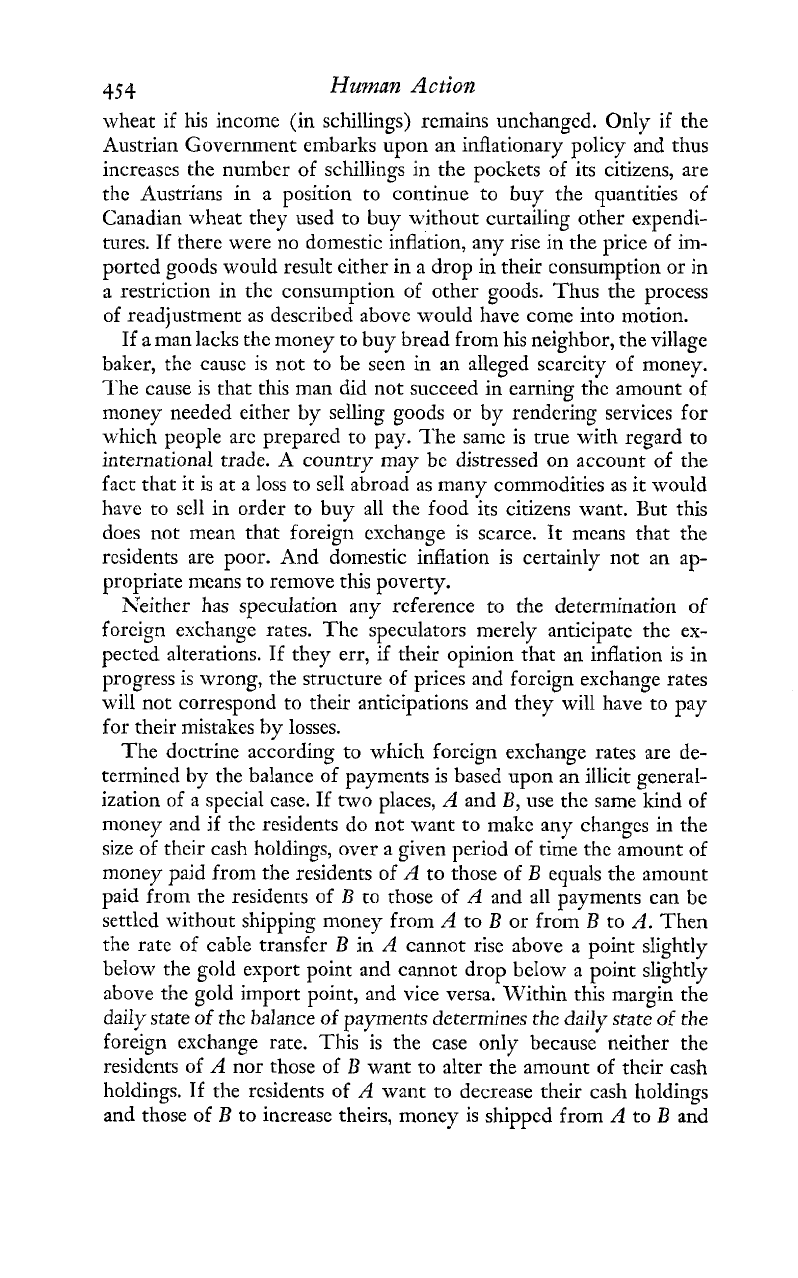
454
Human
Action
wheat if his income (in schillings) remains unchanged. Only
if
the
Austrian Govcrnrnent embarks upon an inflationary policy and thus
increases the number of schillings in the pockets of its citizens, are
the Austrians in a position to continue to buy the quantities of
Canadian wheat they used to buy without curtailing other expendi-
tures. If there were no domestic inflation, any rise in the price of im-
ported goods would result either in a drop in their
consumption
or in
a restriction in the consumption of other goods. Thus the process
of readjustment as described above would have come into motion.
If
a
man lacks the money to buy bread from his neighbor, the village
baker, the cause is not to be seen in an alleged scarcity of money.
The cause is that this man did not succeed in earning the amount of
money needed either by selling goods or by rendering services for
which people are prepared to pay. The samc is true with regard to
international trade.
A
country may be distressed on account of the
fact that it is at a loss to sell abroad as tnany commodities as it would
have to sell in order to buy all the food its citizens want. But this
does not mean that foreign exchange is scarce.
It
means that the
residents are poor. And domestic inflation is certainly not an ap-
propriate means to remove this poverty.
Keither has speculation any reference to
the
determination of
foreign exchange rates. The speculators merely anticipate the ex-
pected alterations. If they err, if their opinion that an inflation is
in
progress is wrong, the structure of prices and foreign exchange rates
will not correspond to their anticipations and they will have to pay
for their mistakes by losses.
The doctrine according to which foreign exchange rates are de-
termined by the balance of payments is based upon an illicit general-
ization of a special case. If
two
places,
A
and
B,
use the same kind of
money and if the residents do not want to make any changes in the
size of their cash holdings, over a given period of time the amount of
money paid from the residents of
A
to those of
B
equals the amount
paid frotn the residents of
B
to those of
A
and all payments can be
settled without shipping money from
A
to
B
or from
R
to
A.
Then
the rate of cabIe transfer
B
in
A
cannot rise above a point slightly
below the gold export point and cannot drop below a point slightly
above the gold import point, and vice versa. W7ithin this margin the
daiIy state of the balance of payments determines thc daily state
of
the
foreign exchange rate. This is the case only becausc neither the
residents of
A
nor those of
B
want to alter the amount of their cash
holdings. If the residents of
A
want to decrease their cash holdings
and those of
B
to increase theirs, money is shipped from
A
to
B
and
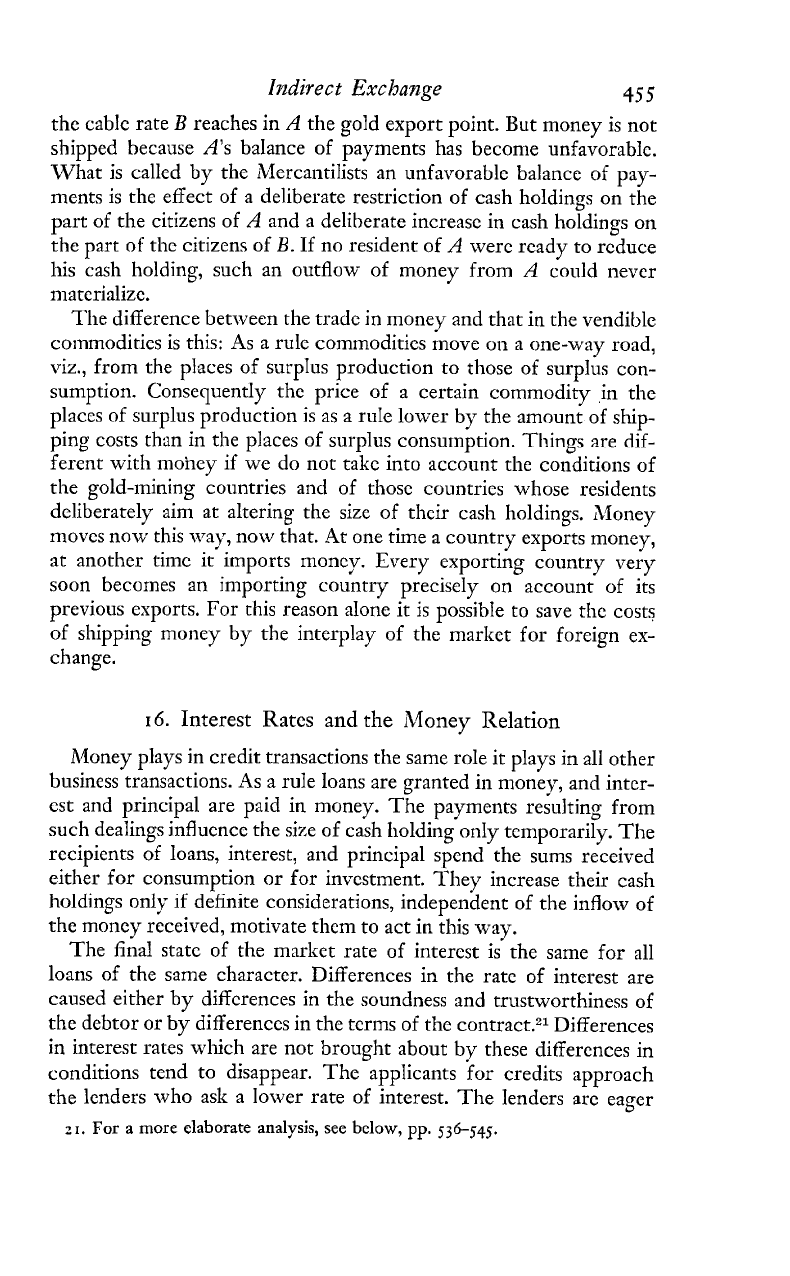
lndirect
Exchange
45
5
the cable rate
B
reaches in
A
the gold export point. But money is not
shipped because
A's
balance of payments has become unfavorable.
TVhat is called by the Mercantilists an unfavorable balance of pay-
ments is the effect of a deliberate restriction of cash holdings on the
part of the citizens of
A
and
a
deliberate increase in cash holdings on
the part of the citizens of
B.
If no resident of
A
were ready to rcduce
his cash holding, such an outflow of money from
A
could never
materialize.
?he difference between the tradc in money and that in the vendible
commodities is this: As a rule commodities move
on
a one-way road,
viz., from the places of surpIus production to those of surplus con-
sumption. Consequently the price of
a
certain commodity in the
places of surplus ~roduction is as a ruIe lower by the amount of ship-
ping costs than in the places of surplus consumption. Things are dif-
ferent with money if we do not takc into account the conditions of
the gold-mining countries and of those countries whose residents
dcliberately aim at altering the size of their cash holdings. Money
moves now this
way,
now that. At one time
a
country exports money,
at another time it imports moncy. Every cxporting country very
soon becomes an importing country precisely on account of its
previous exports. For this reason alone it
is
possibIe to save the costs
of shipping money by the interplay of the market for foreign ex-
change.
16.
Interest Ratcs
and
the
Money
Relation
A4oney plays in credit transactions the same role it plays in all other
business transactions. As
a
rule loans are granted in money, and inter-
est and principal are paid in money. The payments resulting from
such dealings influence the size of cash holding onIy temporarily.
The
recipients of loans, interest, and principal spend the sums received
either for consumption or
for
investment. They increase their cash
holdings only
if
definite considerations, independent of the inflow of
the money received, motivate them to act in this
way.
The final state of the market rate of interest is the same for all
loans of the same character. Differences in the rate of interest are
caused either by
differences
in the soundness and trustworthiness of
the debtor or by differences in the terms of the contract.21 Differences
in interest rates which are not brought about by these differences in
conditions tend to disappear. The applicants ?or credits approach
the lenders who ask a lower rate of interest. The lenders are eager
2
I.
For a more elaborate analysis,
see
below,
pp.
536-545.
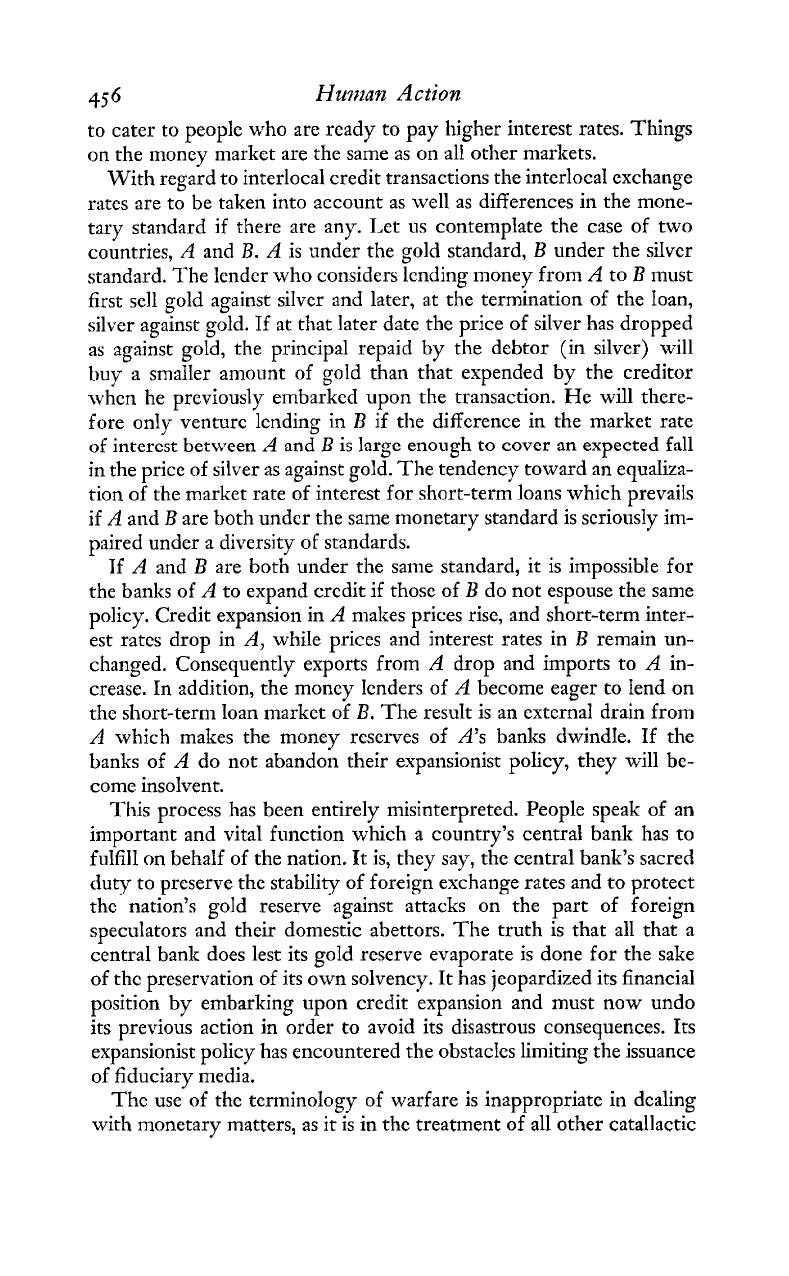
456
Human
Action
to cater to people who are ready to pay higher interest rates. Things
on the money market are the same as on all other markets.
With regaid to interlocal credit transactions the interlocal exchange
rates are to be taken into account as well as differences in the mone-
tary standard if there are any. Ixt us contemplate the case of two
countries,
A
and
8.
A is under the gold standard,
B
under the silver
standard. The lender who considers lending money from A to
B
must
first sell gold against silver and later, at the termination of the loan,
silver against gold. If at that later date the price of silver has dropped
as against gold, the principal repaid by the debtor (in silver) will
buy a smaller amount of gold than that expended by the creditor
when he previously embarked upon the transaction. He will there-
fore only venture lending
in
B
if the difference in the market rate
of interest between A and
B
is large enough to cover an expected fall
in the price of silver as against gold. The tendency toward an equaliza-
tion of the market rate of interest for short-term loans which prevails
if
A
and
R
are both under the same monetary standard is seriously im-
paired under a diversity of standards.
If
A
and
B
are both under the same standard, it is impossible for
the banks of A to expand credit if those of
B
do not espouse the same
policy. Credit expansion in
A
malses prices rise, and short-term inter-
est rates drop in
A,
while prices and interest rates in
B
remain un-
changed. Consequently exports from A drop and imports to A in-
crease. In addition, the money lenders of A become eager to lend on
the short-term loan market of
B.
The result is an external drain from
A
which makes the money reserves of A's banks dwindIe. If the
banks of A do not abandon their expansionist policy, they will be-
come insolvent.
This process has been entirely misinterpreted. People speak of an
important and vital function which a country's central bank has to
fulfill on behalf of the nation. It is, they say, the central bank's sacred
duty to preserve the stability of foreign exchange rates and to protect
the natibn's gold reserve .against attacks on the part of foreign
speculators and their domestic abettors. The truth is that all that a
central bank does lest its gold reserve evaporate is done for the sake
of the preservation of its own solvency. It has jeopardized its financial
position by embarking upon credit kxpansion and must now undo
its previous action in order to avoid its disastrous consequences. Its
expansionist policy has encountered the obstacIes limiting the issuance
of fiduciary media.
The use of the terminology of warfare is inappropriate in dealing
with monetary matters, as it is in the treatment of all other catallactic
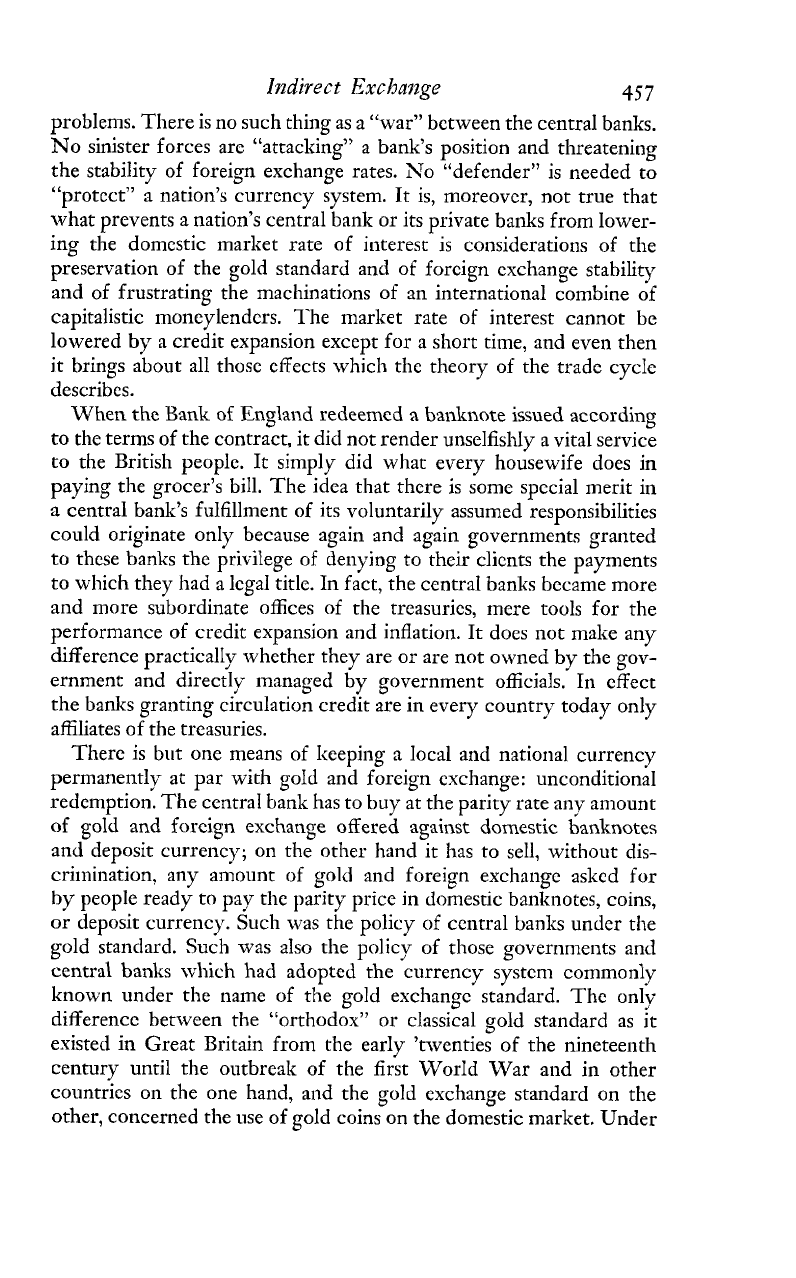
Indirect
Exchange
457
problems. There is no such thing as a "war" between the central banks.
No sinister forces arc "attacking"
a
bank's position and threatening
the stability of foreign exchange rates. No "defender" is needed to
'Lpr~tc~t" a nation's currency system. It is,
moreover,
not true that
what prevents
a
nation's central bank or its private banks from lower-
ing the domestic market rate of interest
is
considerations of the
preservation of the gold standard and of forcign exchange stability
and of frustrating the machinations of an international combine of
capitalistic moneylenders. The market rate of interest cannot be
lowered by a credit expansion except for a short time, and even then
it brings about all those effects which the theory of the trade cyck
describes.
When
the
Bank
of
England redeemed a badmote issued
according
to the terms of the contract, it did not render unselfishly a vital service
to the British people. It simply did what every housewife does in
paying the grocer's bill. The idea that there is some special merit in
a
central bank's fulfillment of its voluntarily assumed responsibilities
could originate only because again and again governments granted
to these banks the privilege of denying to their clicnts the payments
to which they had
a
legal title. In fact, the central banks became more
and more subordinate offices of the treasuries, mere tools for the
performance of credit expansion and inflation. It does not make any
difference practically whether they are or are not owned by the gov-
ernment and directly managed by government officials. In effect
the banks granting circulation credit are in every country today only
affiliates of the treasuries.
There is but one means of keeping a local and national currencJr
permanently at par with gold and foreign exchange: unconditional
redemption. The central bank has to buy at the parity rate any amount
of gold and forcign exchange offered against domestic banknotes
and deposit currency; on the other hand it has to sell, without dis-
crimination, any amount of gold and foreign exchange asked for
by people ready to pay the parity price in domestic banknotes, coins,
or deposit currency. Such was the policy
of
central banks under the
gold standard. Such was also the policy of those governments and
central banks which had adopted the currency system commonly
known under the name of the gold exchange standard. The onli
difference between the "orthodox" or classical gold standard as it
existed in Great Britain from the early 'twenties of the nineteenth
century until the outbreak of the first WorId War and in other
countries on the one hand, and the gold exchange standard on the
other, concerned the use of gold coins on the domestic market. Under
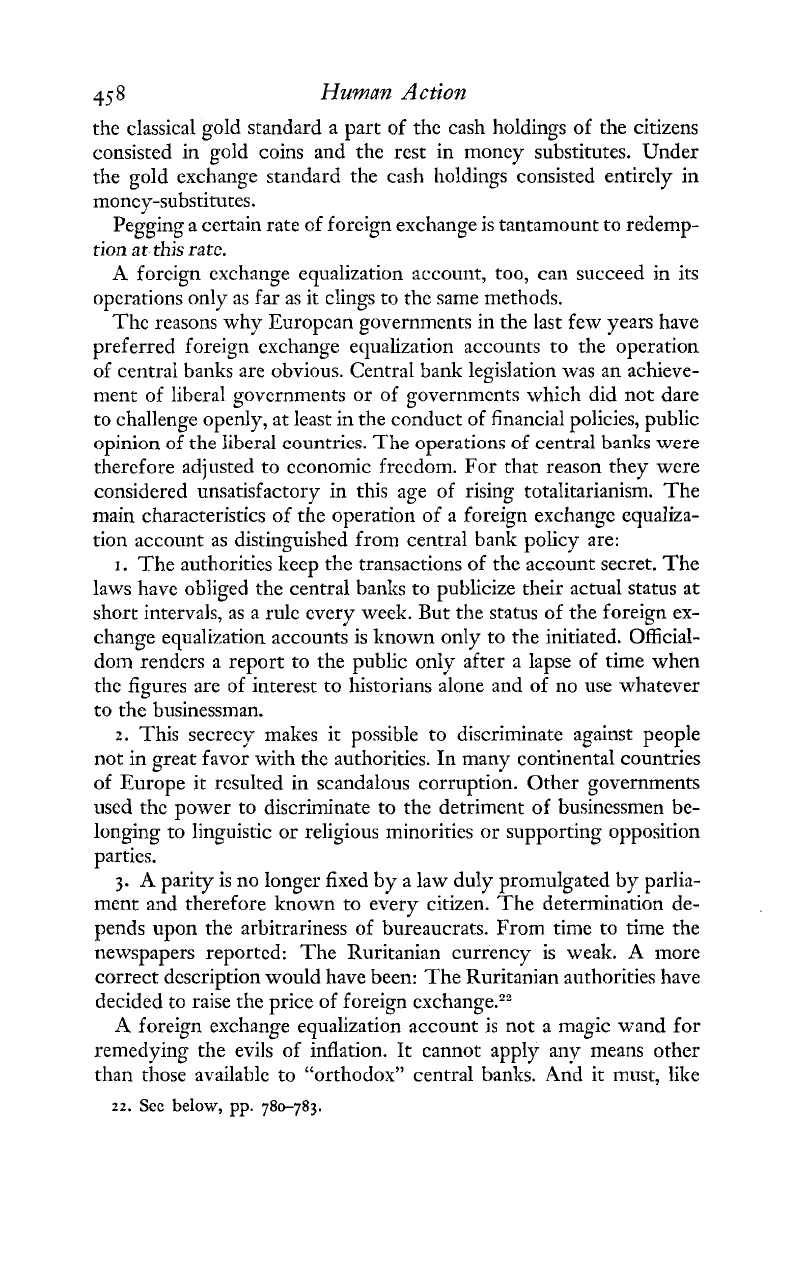
458
Human
Action
the classical gold standard a part of the cash holdings of the citizens
consisted in gold coins and the rest in money substitutes. Under
the gold exchange standard the cash holdings consisted entirely in
money-substitutes.
Pegging a certain rate of foreign exchange is tantamount to redemp-
tion
at
this rate.
A
foreign exchange equalization account, too, can succeed in its
operations only as
far
as it clings to the same methods.
The reasons why European governments in the last few years have
preferred foreign cxchange equalization accounts to the operation
of central banks are obvious. Central bank legislation was an achieve-
ment of liberal governments or of governments which did not dare
to challenge openly, at least in the conduct of financial policies, public
opinion of the liberal countries. The operations of central banks were
therefore adjusted to economic freedom. For that reason they were
considered unsatisfactory in this age of rising totaIitarianism. The
main characteristics of the operation of a foreign exchange equaliza-
tion account as distinguished from central bank policy are:
I.
The authorities keep the transactions of the account secret. The
laws have obliged the central banks to publicize their actual status at
short intervals, as a rule every week. But the status of the foreign ex-
change equalization accounts is known only to the initiated. Official-
dom renders a report to the public only after a lapse of time when
the figures are of interest to historians alone and of no use whatever
to the businessman.
z.
This secrecy makes it possible to discriminate against people
not in great favor with the authorities. In many continental countries
of Europe it resulted in scandalous corruption. Other governments
used the power to discriminate to the detriment of businessmen be-
longing to linguistic or religious minorities or supporting opposition
parties.
3.
A
parity is no longer fixed by a law duly promulgated by parlia-
menr: and therefore known to every citizen. The determination de-
pends upon the arbitrariness of bureaucrats. From time to time the
newspapers reported: The Ruritanian currency is weak.
A
more
correct description would have been: The Ruritanian authorities have
decided to raise the price of foreign ~xchange.?~
A
foreign exchange equalization account
is
not a magic wand for
remedying the evils of inflation. It cannot apply any means other
than those available to "orthodox" central banks.
A&
it
must, like
22.
Sec
below,
pp.
780-783.
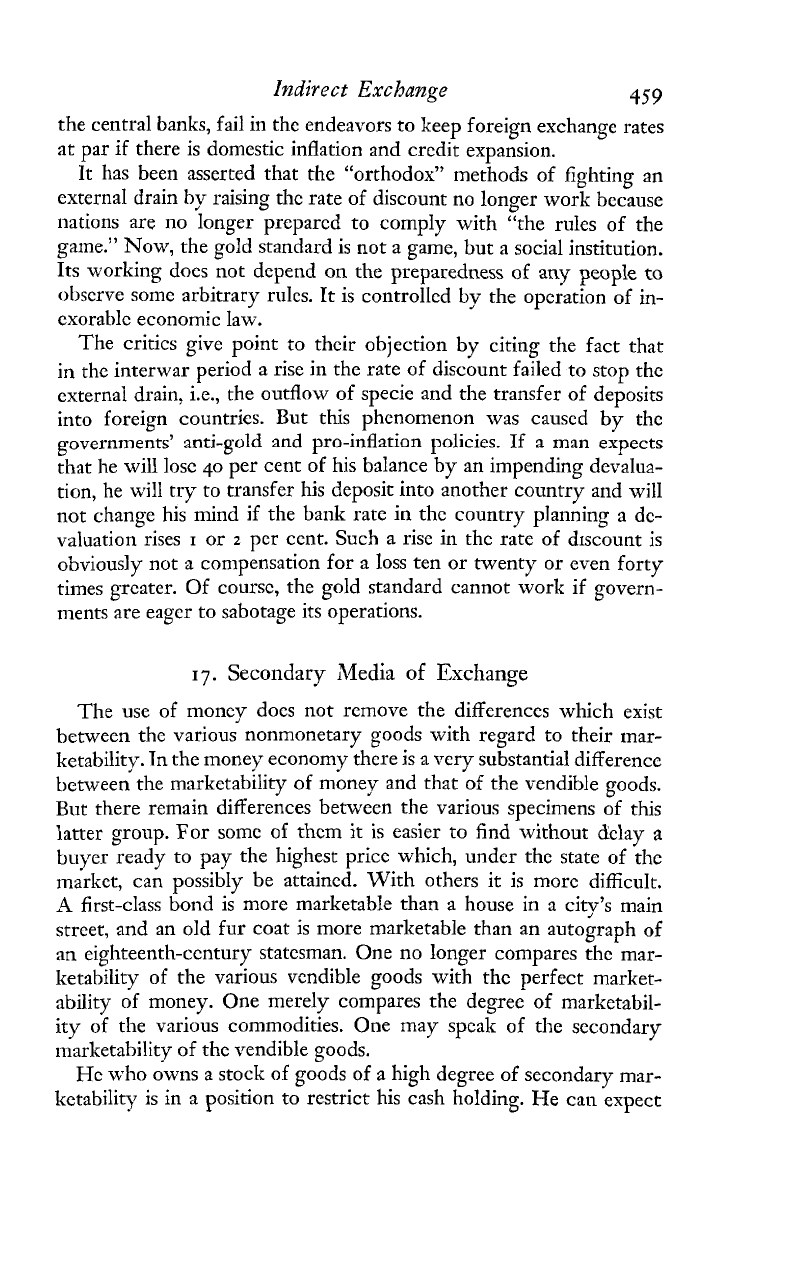
Indirect Exchange
459
the central banks, fail in the endeavors to keep foreign exchange rates
at par if there is domestic inflation and credit expansion.
It has been asserted that the "orthodox" rnethods of fighting an
external drain by raising thc rate of discount no longer work because
nations are no longer prepared to comply with "the rules of the
game." Now, the gold standard is not a game, but a social institution.
Its working does not dcpend on the preparedness of any
people
to
observe some arbitrary rules. It is controlled by the operation of in-
exorablc economic law.
The critics give point to their objection by citing the fact that
in the interwar period a rise in the rate of discount failed to stop the
external drain, i.e., the outflow of specie and the transfer of deposits
into foreign countries. But this phcnomenon was caused by the
governments' anti-gold and pro-inflation policies.
If
a man expects
that he will lose 40 per cent of his balance by an impending devalua-
tion, he will try to transfer his deposit into another country and will
not change his mind if the bank rate in the country planning a dc-
valuation rises
I
or
z
per cent. Such
a
rise in the rate of drscount is
obviously not a compensation for a loss ten or twenty or even forty
tilnes greater. Of course, the gold standard cannot work if govern-
ments are eager to sabotage its operations.
I
7.
Secondary
Media
of
Exchange
The use of money does not remove the differences which exist
between
the various nonmonetary goods with regard to their mar-
ketability. Tn the money economy there is a very substantial difference
between the marketability of money and that of the vendible goods.
But there remain differences between the various specimens of this
latter group. For some of them
it
is easier to find without &lay
a
buyer ready to pay the highest pricc which, under the state of the
market, can possibly be attained. With others it is morc difficult,
,4
first-class bond is more marketable than a house in
3
city's main
streer, and an old fur coat is more marketable than an autograph of
an eighteenth-century statesman. One no longer compares the mar-
ketability of the various vendible goods with the perfect market-
ability of money. One merely compares the degree of marketabil-
ity of the various commodities. One may speak of the secondary
marketability of the vendible goods.
He who owns a stock of goods of a high degree of secondary mar-
ketability is in a position to restrict his cash holding. He can expect
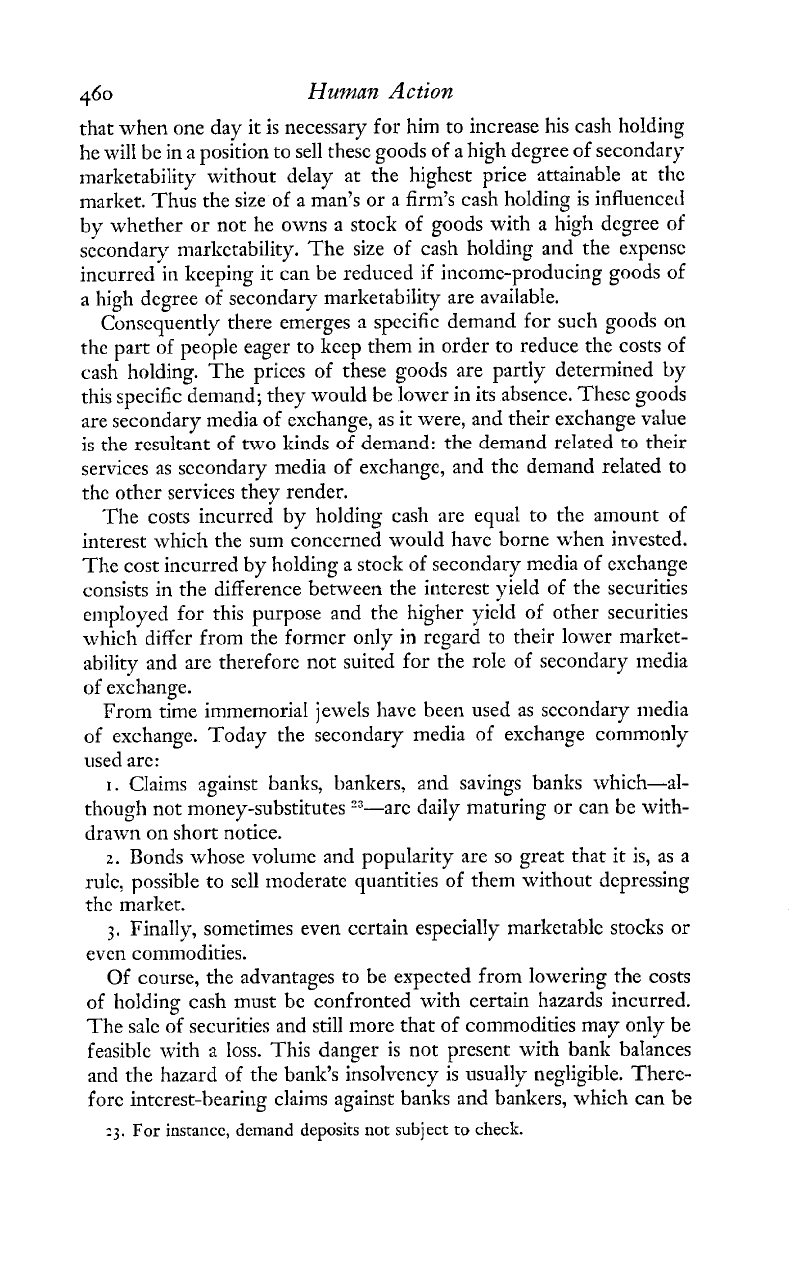
460
Human
Action
that when one day it is necessary for him to increase his cash holding
he will be in a position to sell thesc goods of a high dcgree of secondary
marketability without delay at the highest price attainable at the
market. Thus the size of a man's or a firm's cash holding is influencetl
b\; whether or not he owns a stock of goods with a high degree of
sfcondary marketability. The size of cash holding and the expcnsc
incurred in keeping it can be reduced if income-producing goods of
a high degree of secondary marketability are availabie.
Consequently
there emerges a specific demand for such goods on
the part of people eager to kcep them in order to reduce the costs of
cash holding. The priccs of these goods are partly determined by
this specific demand; they would be lower in its absence. Thesc goods
are secondary media of exchange, as it were, and their exchange value
is
the rcsultant of two kinds of demand: the demand rclated to their
services as secondary media of exchange, and the demand related to
the other services they render.
The costs incurred by holding cash are equal to thc amount of
interest which the sum concerned would havc borne when invested.
The cost incurred by holding a stock of secondary media of exchange
consists in the difference between the interest yield of the securities
empIoyed for this purpose and the higher yield of other securities
which differ from the former only in regard to their lower market-
ability and are thereforc not suitcd for the role of secondary media
of exchange.
From time immemorial jewels have been used as secondary media
of exchange. Today the secondary media of exchange commonly
used arc:
I.
Claims against banks, bankers, and savings banks which-al-
though not money-substitutes "-arc daily maturing or can
be
with-
drawn on short notice.
z.
Bonds whose volume and popularity are so great that it is, as a
rule. possible to sell moderate quantities of them without depressing
thc market.
;,
Finally, sometimes even ccrtain especially marketablc stocks or
even commodities.
Of
course, the advantages to be expected from lowering the costs
of holding cash must be confronted with certain hazards incurred.
The sale of securities and still more that of comrnoditics may only be
feasible with a loss. This danger is not present with bank balances
and the hazard of the bank's insolvency is usually negligible. There-
fore
interest-bearing claims against banks and bankers, which can be
23.
For instance, demand deposits not
subject
to check.
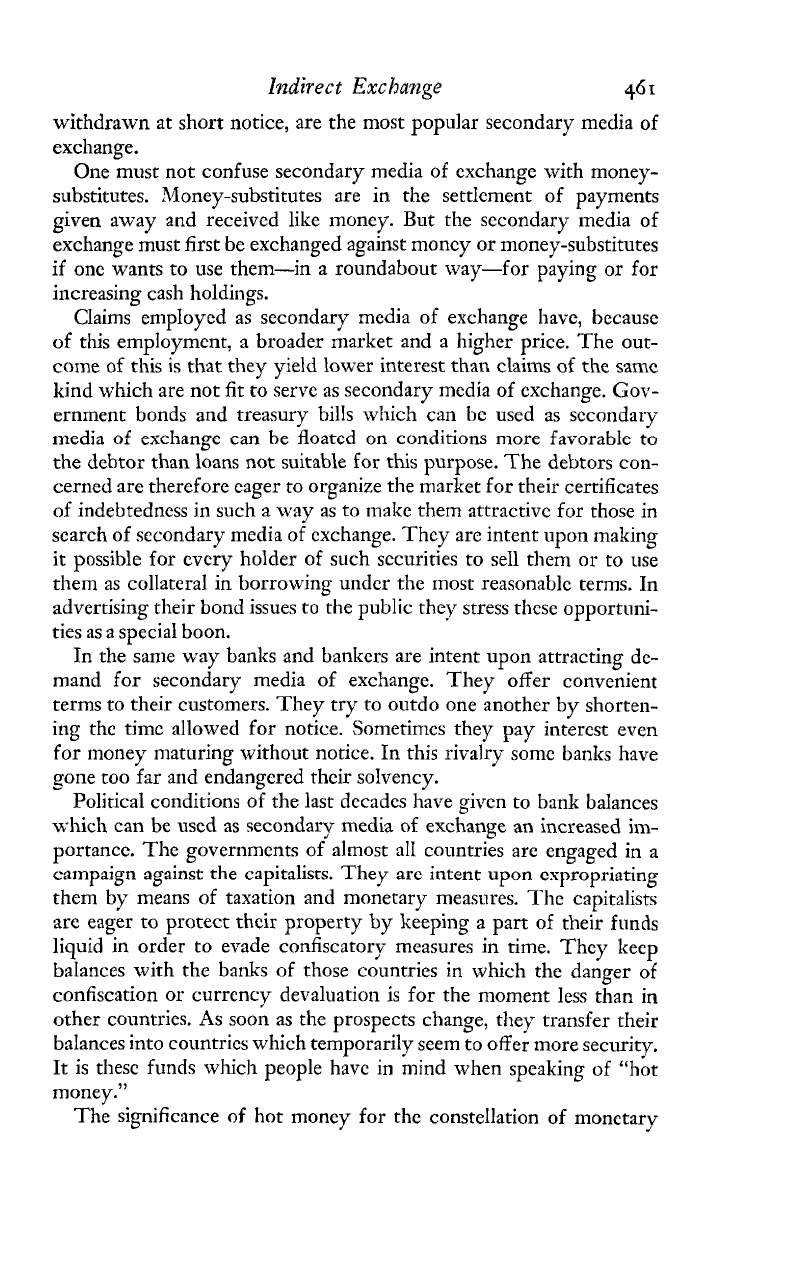
Indirect
Exchange
withdrawn at short notice, are the most popular secondary media of
exchange.
One must not confuse secondary media of exchange with money-
substitutes. Money-substitutes are in the settlement of payments
given away and receivcd like money. But the secondary ~nedia of
exchange must first be exchanged against moncy or money-substitutes
if one wants to use them-in a roundabout way-for paying or for
increasing cash holdings.
Claims employed as secondary media of exchange have, because
of this ernploymcnt, a broader market and a higher price. The out-
come of this is that they yield lower interest than claims
of
the same
kind which are not fit to serve as secondary media of cxchange. Gov-
ernment bonds and treasury bills which can
be
used as secondary
media of exchange can be floated on conditions more favorable to
the debtor than loans not suitable for this purpose. The debtors con-
cerned are therefore eager to organize the market for their certificates
of indebtedness in such a way as to make them attractivc for those in
search of secondary media of exchange. Thcy are intent upon making
it possible for every holder of such
securities
to sell them or to use
them as collateral in borrowing under the most reasonablc terms. In
advertising their bond issues to the public they stress these opportuni-
ties
as
a special boon.
In the same way banks and bankers are intent upon attracting de-
mand for secondary media of exchange. They offer convenient
terms to their customers. They try to outdo one another by shorten-
ing the time allowed for notice.
Sometimes
they pay interest even
for money maturing without notice.
In
this rivalry some banks have
gone too far and endangered their solvency.
L.
Political conditions of the last decades have given to bank balances
which can be used as secondary media of exchange an increased
im-
portance. The governments of almost a11 countries are engaged in a
campaign against the capiralists. They are intent upon cspropriating
them by means
of
taxation and monetary measures. The capitalists
are eager to protect their property by keeping a pan of their funds
liquid in order to evade confiscatory measures in time. They beep
balances with the banks of those countries in which the danger of
confiscation or currency devaluation is for the moment less than
in
other countries. As soon as the prospects change, they transfer their
balances into countries which temporarily seem to offer more security.
It is these funds which people have in mind when speaking of "hot
money."
The significance
of
hot money for the constellation of monetary
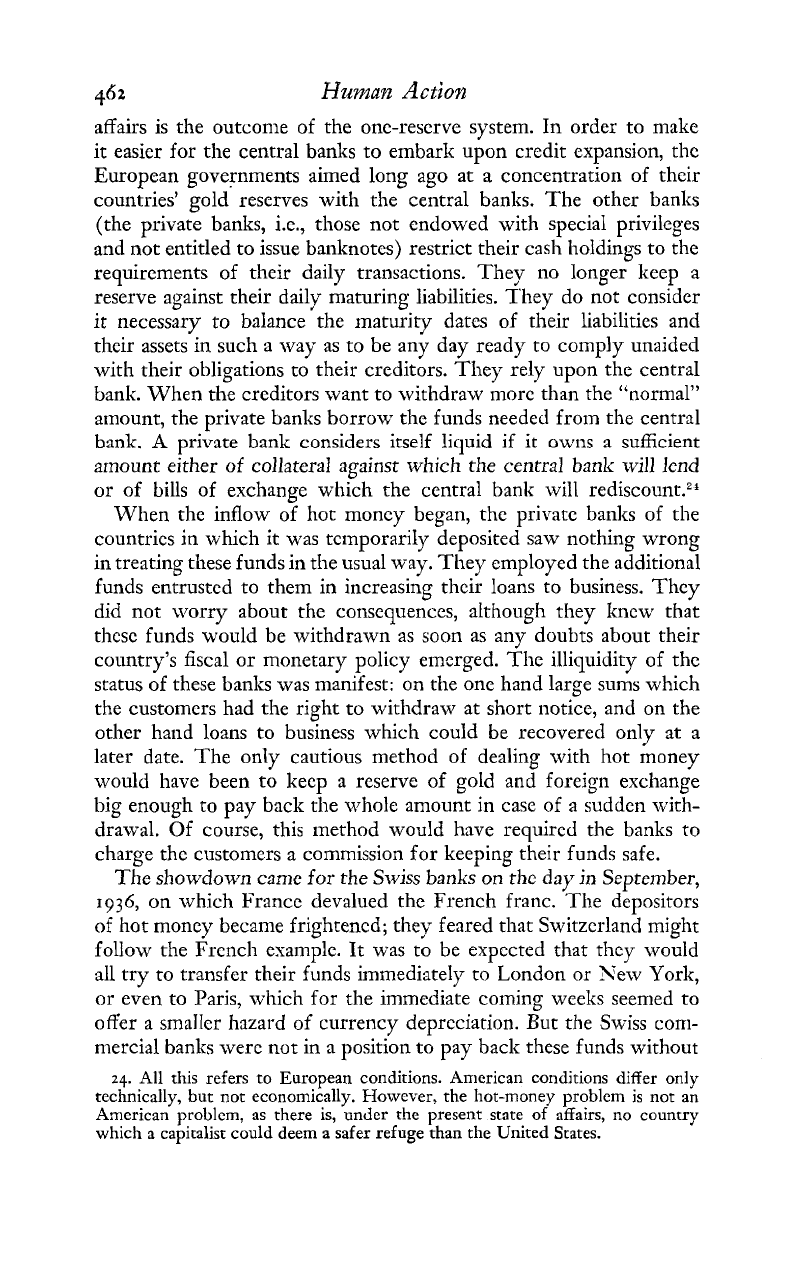
462
Human
Action
affairs is the outcome of the one-reserve system. In order to make
it easier for the central banks to embark upon credit expansion, the
European governments aimed long ago at
a
concentration of their
countries' gold. reserves with the central banlis. The other banks
(the private banks, i.e., those not endowed with special privileges
and not entitled to issue banknotcs) restrict their cash holdings to the
requirements of their daily transactions. They no longer keep a
reserve against their daily maturing liabilities. They do not consider
it
necessary to balance the maturity dates of their liabilities and
their assets in such a way as to be any day ready to comply unaided
with their obligations to their creditors. They rely upon the central
bank. When the creditors want to withdraw more than the "normal"
arnount, the private banks borrow the funds needed from the central
bank.
A
private bank considers itself liquid
if
it owns a sufficient
amount either of collateral against
which
the central bank
will
lend
or of bills of exchange which the central bank will redisco~nt.~~
When the inflow of hot money began, the private banks of the
countries in which it was temporarily deposited saw nothing wrong
in treating these funds in the usual w-ay. They employed the additional
funds entrusted to them in increasing their loans to business. They
did not worry about the consequences, although they knew that
these funds would be withdrawn as soon as any doubts about their
country's fiscal or monetary policy emerged. The illiquidity of the
status of these banks was manifest: on the one hand large sums which
the customers had the right to withdraw at short notice, and on the
other hand loans to business which could be recovered only at a
later date. The only cautious method of dealing with hot money
would have been to keep a reserve of gold and foreign exchange
big enough to pay back the whole amount in case of a sudden with-
drawal. Of course, this method would have required the banks
to
charge the customers a commission for keeping their funds safe.
The showdown came
for
the Swiss banks on
thc
day in September,
1936,
on which France devalued the French franc. 'The depositors
of hot money became frightened; they feared that Switzerland might
follow the French example. It was to be expected that they would
all try to transfer their funds immediately to London or New York,
or even to Paris, which for the immediate coming weeks seemed to
offer a smaller hazard of currency depreciation. But the Swiss com-
mercial banks were not in
a
position to pay back these funds without
24.
All this refers to European conditions. American conditions differ only
technically, but not economically. However, the hot-money problem is not an
American problem, as there is, under the present state of affairs, no country
which a capitalist could deem
a
safer refuge
than
the United States.
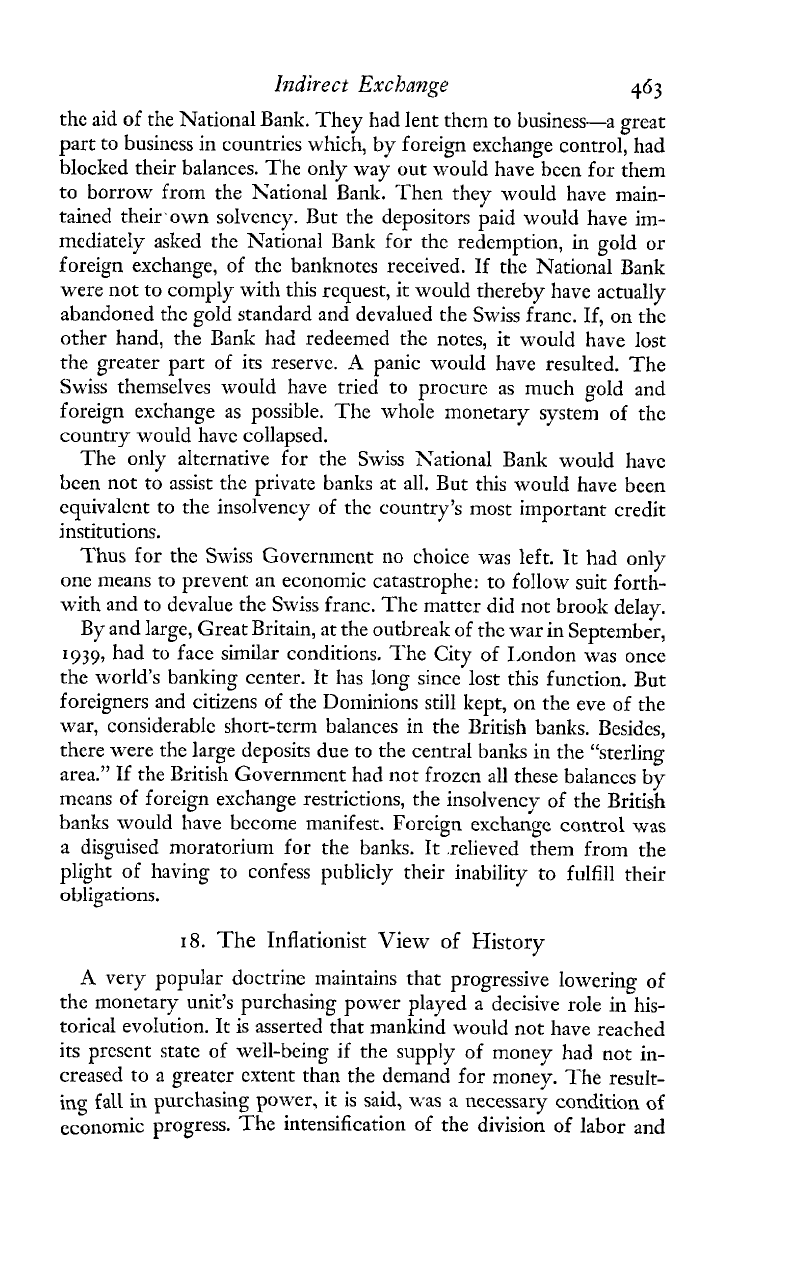
Indirect
Exchange
463
the aid of the National Bank. They had lent them to business-a great
part to business in countries which, by foreign exchange control, had
blocked their balances. The only way out would have been for them
to borrow from the National Bank. Then they would have main-
tained their own solvency. But the depositors paid would have im-
mediately asked the hTational Bank for the redemption, in gold or
foreign exchange, of the banknotes received. If the National Bank
were not to comply with this request, it would thereby have actually
abandoned the gold standard and devalued the Swiss franc. If, on the
other hand, the Bank had redeemed the notes, it would have lost
the greater part of ics reserve.
A
panic would have resulted. The
Swiss then~selves would have tried to procure as much gold and
foreign exchange as possible. The whole monetary system of the
country would havc collapsed.
The only alternative for the Swiss National Bank would havc
been not to assist the private banks at all. But this would have been
equivalent to the insolvency of the country's most important credit
institutions.
Thus for the Swiss Governincnt no choice was left. It had only
one means to prevent an economic catastrophe: to follow suit forth-
with and to devalue the Swiss franc. The matter did not brook delay.
By and large, Great Britain, at the outbreak of the war in September,
1939,
had to face similar conditions. The City of 1,ondon was once
the world's banking center. It has long since lost this function. But
foreigners and citizens of the Dominions still kept, on the eve of the
war, considerable short-term balances in the British banks. Besides,
there w-ere the large deposits due to the central banks in the "sterling
area." If the British Government had not frozcn all these balances by
means of foreign exchange restrictions, the insolvency of the British
banks would have become manifest. Foreign exchange control was
a disguised moratorium for the banks. It relieved them from the
plight of having to confess publicly their inability to fulfill their
obligations.
18.
The
Inflationist View of History
A
very popular doctrine maintains that progressive lowering of
the monetary unit's purchasing power played a decisive role in his-
torical evoIution. It is asserted that mankind would not have reached
its present state of well-being if the supply of money had not in-
creased to a greater extent than the demand for money. The result-
ing
fall
in
purchasing power, it is said, was
a
necessary condition of
economic progress. The intensification of the division of labor and
